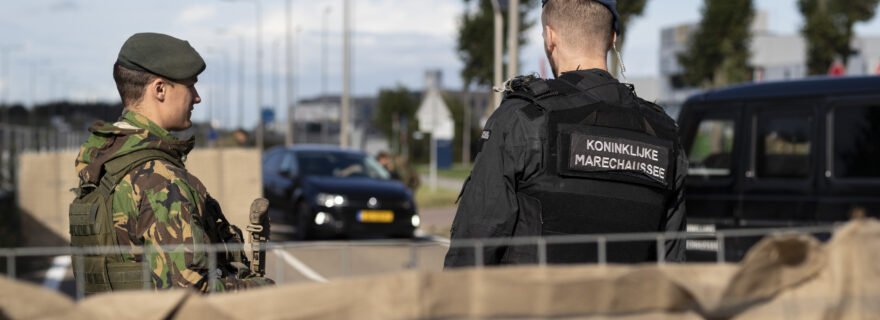The Dutch security dilemma and the role of the Police, the Military Police and the Military
The Netherlands is struggling with organised crime, security issues and police shortages. With the military police and the military now becoming increasingly involved, it’s time for some questions.
The Dutch police and police unions frequently report problematic staff and budget shortages that could result in difficulties combatting crime and ensuring safety. One recent development is that the Dutch army is now helping to guard courthouses during criminal trials. Another development in domestic policing is the growing importance of the Royal Netherlands Marechaussee (RNM): the Dutch military police. Although a legal framework that allows for such military (police) involvement is not new, the question remains what such ‘blurring’ of internal and external security entails for the actual execution of police tasks. In this blog I critically reflect on this issue and engage in a dialogue with a fellow blogger.
The Police (and policing styles)
There are two major police forces in the Netherlands: the civil National Police (NP; approx. 51,000 officers) and the more specialised and ‘back up’ force: the military RNM (approx. 7,700 officers). Policing in the Netherlands is based on the philosophy of Community Oriented Policing (COP, originating from the Peel’s principles of policing) with an emphasis on prevention, trust, and strong ties to neighbourhoods and communities. Therefore, each year the NP publishes a Year Report about all activities and policies. The RNM, embedded within the Ministry of Defence, does not publish such a report or have strong ties to civilian communities. The organisation and its leadership are centralised. Its training and culture also differ from the NP; they resemble a military(-style) organisation. A question to be answered from this perspective is whether the RNM fits in the COP style, or is instead more in line with the Military Bureaucratic Model (MBM) of Policing, which is less favoured in modern liberal democracies because of its historic roots in colonialism and dictatorships, and a focus on repression and state control. Due to operational disfunction and incompatibility with COP, Belgium dissolved its military police force the Rijkswacht in 2001.
The Military Police (and its importance)
Contrary to the Belgian Rijkswacht, the RNM is far from being dissolved. It is actually growing in funds, staff, and importance. For years the Dutch have struggled with the (threat of) serious organised crime, its effect on civil society, and the impact this has on (actors in) the criminal justice system. In this context, the RNM appears to be on ‘speed dial’. Already in 2016, a new squadron was established for the high-risk protection of government infrastructure, followed by another squadron in 2022 to protect politicians and judges. During the COVID-19 pandemic, the RNM intensified border control operations and was called on to assist in riot control. The RNM’s role as strategic back-up for the NP is as relevant as ever. This means that regular Dutch civilians notice and are possibly confronted with the RNM more often. What are the implications of this? Unfortunately, no Dutch studies have yet elaborated on the effects of this increased RNM presence. The literature, however, suggests that increased ‘militarisation’ (expressed in equipment, tactics, organisational culture, and structure) relates to a policing style that is less community-oriented. In itself this does not pose a problem per se: a more ‘robust’ police force might be the logical ‘go-to’ in countering serious threats. In that respect, a different approach to communities might exactly be what is needed now. That said, it must be noted that the RNM also performs policing duties in less high-risk settings, where less ‘robustness’ is needed. The issue that makes this increased RNM presence a problem is that we simply do not know what it means to have a military police force that is increasingly (also) policing (in) our streets. What does this mean for the use of force or concerning the relationship between the public and the (military) police?
The Military (and its domestic role)
The current security dilemma requires a policing solution, whether this solution is evidence-based or perhaps more pragmatic. Currently, the solution seems to be more military involvement in domestic policing, similar to past decades: army assistance to police units and a growing role for the RNM. This ‘green’ assistance was discussed in a special issue of the journal ‘Justitiële Verkenningen’ and more recently by a fellow blogger. The advantages are clear in some cases, for example when specific military qualities are needed to support police work. On the other hand, similar to the lack of knowledge about policing by the RNM, the (dis)advantages of using military personnel in substantive policing roles are unclear, although this is already happening and they can use real police powers such as the use of force. Questions to consider are how do military officers perform these policing tasks? How are they trained? Will this be effective and proportional?
Despite the Belgian dissolution of the Rijkswacht and what we know from existing literature, these major ‘blind spots’ in Dutch public debate and police research have not been addressed yet. A transparent annual report on military (police) involvement in domestic policing, such as the one published by the NP, would offer a stepping stone to researchers and politicians to engage with that ‘blind spot’ on a basic level. However, further research and more fundamental debate is needed. Until that time, it would be wise to refrain from committing (organised) crime, to follow (military) police orders, and to hope for a successful pragmatic approach to the Dutch security dilemma.



0 Comments
Add a comment